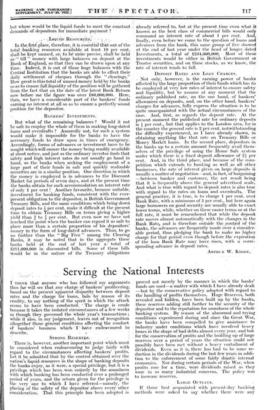BANKERS' INVESTMENTS.
But what of the .remaining balances ? Would it not be safe to employ the whole of them in making long-dated loans and overdrafts ? Assuredly not, for such a system would make it impossible for the banks to have the necessary funds to draw upon .in times of emergency, Accordingly, forms of advances or investment have to be Sought which will ensure the money being readily available at short notice, and just as the ordinary investor finds that safety and high interest rates do not usually go hand iii hand, so the banks when_ seeking the employment of a large part of their funds in safe and quickly realizable Securities are in a similar position. One direction in which the money is employed is in advances to the Discount Market for periods of seven days, and at the present time the banks obtain for such accommodation an interest rate of only 1 per cent ! Another favourite, because suitable; investment for banking funds, consistent with the eves present obligation to the depositor, is British Government Treasury Bills, and the same conditions which bring down deposit rates to per cent. make it difficult at the present time to obtain Treasury Bills on terms giving a higher yield than to I- per cent. But even now we have not reached the point when the banker can regard it as safe to Place more than a certain proportion of his depositors' money in the .form of long‘clated advances. Thus; to go no further than the "'Big Five" among the Clearing Banks, it may be noted that in the aggregate these banks held ,* at the end of last .year a., total of 1211,000,000 in discounted bills. Some of these bills Would be in the nature of the Treasury obligations already referred to, but at the present time even what I known as the best class of commercial bills would only command an interest rate of about 1 per cent. And; finally, even before 'we come to the question of loans and advances from the bank, this same group of five showed at the end of last year under the head of longer dated Investments, _ a total of $234,000,000, Most of these investments would be either in British. Government or Trustee securities, and on these stocks, as we know, the rate of interest tends to fall. -














































 Previous page
Previous page